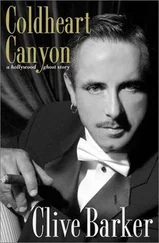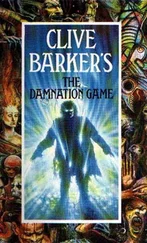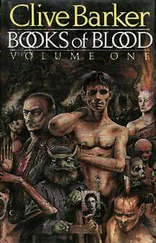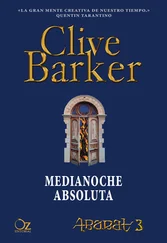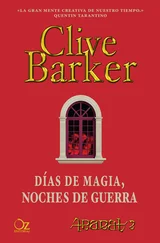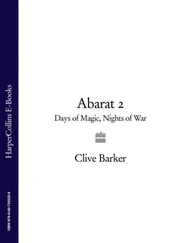CLIVE BARKER
IMAJICA

 Copyright
Copyright
This novel is entirely a work of fiction. The names, characters and incidents portrayed in it are the work of the author’s imagination. Any resemblance to actual persons, living or dead, events or localities is entirely coincidental.
HarperCollins Publishers Ltd. 1 London Bridge Street London SE1 9GF
www.harpercollins.co.uk
First published in Great Britain by HarpcrCollins Publishers 1991
Copyright © Clive Barker 1991
Clive Barker asserts the moral right to be identified as the author of this work
A catalogue copy of this book is available from the British Library
All rights reserved under International and Pan-American Copyright Conventions. By payment of the required fees, you have been granted the nonexclusive, nontransferable right to access and read the text of this ebook on-screen. No part of this text may be reproduced, transmitted, downloaded, decompiled, reverse engineered, or stored in or introduced into any information storage and retrieval system, in any form or by any means, whether electronic or mechanical, now known or hereinafter invented, without the express written permission of HarperCollins ebooks
HarperCollins Publishers has made every reasonable effort to ensure that any picture content and written content in this ebook has been included or removed in accordance with the contractual and technological constraints in operation at the time of publication
Source ISBN: 9780006178040
Ebook Edition © OCTOBER 2010 ISBN: 9780007355402
Version: 2019-01-18
‘Even in greater in size and scope than Weaveworld … erotic, apocalyptic, often horrifying, Imajica is beautifully written, a marvellous feat of the imagination.’
City News
‘An invocation of both magic and the imagination, a novel of eerie and erotic enchantment. In Imajica we witness the finest use of the dialect of horror and fantasy: the pursuit of possibilities. Imajica is an existential-romantic quest, a speculation on the nature of woman and man, goddess and god, reality and dream. A majestic maze of mythmaking, a fiction that questions all assumptions of its reality - and our own.’
Washington Times
‘Barker’s prodigious imagination delivers magicians, dopplegangers, Boschean creatures of staggeringly various descriptions and a pantheon of gods and goddess, seduced by power and redeemed by love in a story of violence, occasional unconventional eroticism and mesmerising invention.’
Publishers Weekly
Cover
Title Page
Copyright
Praise
CHAPTER ONE
CHAPTER TWO
CHAPTER THREE
CHAPTER FOUR
CHAPTER FIVE
CHAPTER SIX
CHAPTER SEVEN
CHAPTER EIGHT
CHAPTER NINE
CHAPTER TEN
CHAPTER ELEVEN
CHAPTER TWELVE
CHAPTER THIRTEEN
CHAPTER FOURTEEN
CHAPTER FIFTEEN
CHAPTER SIXTEEN
CHAPTER SEVENTEEN
CHAPTER EIGHTEEN
CHAPTER NINETEEN
CHAPTER TWENTY
CHAPTER TWENTY-ONE
CHAPTER TWENTY-TWO
CHAPTER TWENTY-THREE
CHAPTER TWENTY-FOUR
CHAPTER TWENTY-FIVE
CHAPTER TWENTY-SIX
CHAPTER TWENTY-SEVEN
CHAPTER TWENTY-EIGHT
CHAPTER TWENTY-NINE
CHAPTER THIRTY
CHAPTER THIRTY-ONE
CHAPTER THIRTY-TWO
CHAPTER THIRTY-THREE
CHAPTER THIRTY-FOUR
CHAPTER THIRTY-FIVE
CHAPTER THIRTY-SIX
CHAPTER THIRTY-SEVEN
CHAPTER THIRTY-EIGHT
CHAPTER THIRTY-NINE
CHAPTER FORTY
CHAPTER FORTY-ONE
CHAPTER FORTY-TWO
CHAPTER FORTY-THREE
CHAPTER FORTY-FOUR
CHAPTER FORTY-FIVE
CHAPTER FORTY-SIX
CHAPTER FORTY-SEVEN
CHAPTER FORTY-EIGHT
CHAPTER FORTY-NINE
CHAPTER FIFTY
CHAPTER FIFTY-ONE
CHAPTER FIFTY-TWO
CHAPTER FIFTY-THREE
CHAPTER FIFTY-FOUR
CHAPTER FIFTY-FIVE
CHAPTER FIFTY-SIX
CHAPTER FIFTY-SEVEN
CHAPTER FIFTY-EIGHT
CHAPTER FIFTY-NINE
CHAPTER SIXTY
CHAPTER SIXTY-ONE
CHAPTER SIXTY-TWO
Keep Reading
About the Author
Also by the Author
About the Publisher
It was the pivotal teaching of Pluthero Quexos, the most celebrated dramatist of the Second Dominion, that in any fiction, no matter how ambitious its scope or profound its theme, there was only ever room for three players. Between warring kings, a peacemaker; between adoring spouses, a seducer, or a child. Between twins, the spirit of the womb. Between lovers. Death. Great numbers might drift through the drama, of course - thousands in fact - but they could only ever be phantoms, agents or, on rare occasions, reflections of the three real and self-willed beings who stood at the centre. And even this essential trio would not remain intact, or so he taught. It would steadily diminish as the story unfolded, three becoming two, two becoming one, until the stage was left deserted.
Needless to say, this dogma did not go unchallenged. The writers of fables and comedies were particularly vociferous in their scorn, reminding the worthy Quexos that they invariably ended their own tales with a marriage and a feast. He was unrepentant. He dubbed them cheats, and told them they were swindling their audiences out of what he called the last great procession, when, after the wedding songs had been sung and the dances danced, the characters took their melancholy way off into darkness, following each other into oblivion.
It was a hard philosophy, but he claimed it was both immutable and universal, as true in the Fifth Dominion, called Earth, as it was in the Second.
And more significantly, as certain in life as it was in art.
Being a man of contained emotion, Charlie Estabrook had little patience with the theatre. It was, in his bluntly stated opinion, a waste of breath; indulgence, flummery, lies. But had some student recited Quexos’s First Law of Drama to him this cold November night he would have nodded grimly, and said: all true, all true. It was his experience precisely. Just as Quexos’s Law required, his story had begun with a trio: himself, John Furie Zacharias, and between them, Judith. That arrangement hadn’t lasted very long. Within a few weeks of setting eyes on Judith he had managed to supersede Zacharias in her affections, and the three had dwindled to a blissful two. He and Judith had married, and lived happily for five years, until, for reasons he still didn’t understand, their joy had foundered, and the two had become one.
He was that one, of course, and the night found him sitting in the back of a purring car being driven around the frosty streets of London in search of somebody to help him finish the story. Not, perhaps, in a fashion Quexos would have approved of—the stage would not be left entirely empty - but one which would salve Estabrook’s hurt.
He wasn’t alone in his search. He had the company of one half-trusted soul tonight: his driver, guide and procurer, the ambiguous Mr Chant. But despite Chant’s shows of empathy, he was still just another servant, content to attend upon his master as long as he was promptly paid. He didn’t understand the profundity of Estabrook’s pain; he was too chilly, too remote. Nor, for all the length of his family history, could Estabrook turn to his lineage for comfort. Although he could trace his ancestors back to the reign of James the First, he had not been able to find a single man on that tree of immoralities - even to the bloodiest root - who had caused, either by his hand or hiring, what he, Estabrook, was out this midnight to contrive: the murder of his wife.
Читать дальше
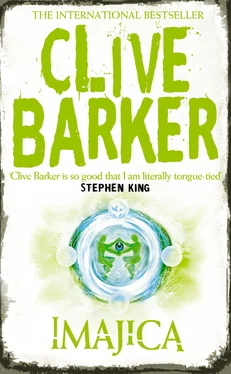

 Copyright
Copyright

